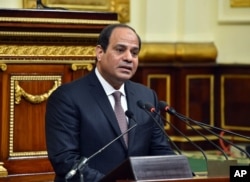Former Egyptian presidential candidate Khaled Ali and other political activists were arrested amid a clampdown on opposition activists ahead of the upcoming 2018 election, according to Amnesty International. At least 36 people in 17 cities were jailed, some in connection with comments they posted online about the elections.
"The presidential elections are not scheduled to take place until 2018, yet the Egyptian authorities seem intent on preemptively crushing any potential rivals to maintain their grip on power," said Najia Bounaim, Amnesty International's campaigns director for North Africa.
Ali, a prominent human rights lawyer, faces trial Monday for "violating public morals." The charge is related to an image of Ali, which shows him celebrating among his supporters with arms spread wide, outside the High Administrative Court after winning a case that reversed a government decision to turn over control of two islands in the Red Sea to Saudi Arabia. Ali's lawyer, Negad al Borei, told Amnesty International that he was accused of making physical gestures "that violate public morals."
If Ali is convicted, he could face up to two years in prison, a fine of 5,000-10,000 EGP ($250-$550), or both.
"Khaled Ali's arrest and prosecution was clearly politically motivated," Bounaim said. "The Egyptian authorities must drop the absurd charges he is facing and end the smear campaign against him."
Ali, who ran in Egypt's 2012 presidential election, has implied that he may run against current President Abdel Fattah el-Sissi in 2018. Ali and other political activists have been critical of Sissi on social media and other online platforms, resulting in backlash from Egyptian authorities.
In almost 30 cases, members of Egypt's National Security Agency broke into activists' homes early in the morning, detaining them for hours then questioning them without the assistance of their lawyers. The charges included accusations of "insulting the president" via social media and "misusing social media platforms."
"The wide-scale and coordinated nature of the crackdown against political activists makes it even more chilling," Bounaim said. "The authorities are shamelessly using the draconian counterterrorism law to round up young political activists for social media posts merely criticizing President Abdel Fattah el-Sissi."
In the 2014 Egyptian presidential election, Sissi won almost 97 percent of the vote against his lone opponent, Hamdeem Sabahi. During the run-up to that election, the opposition to Sissi saw aggression and the erratic arrests of Sabahi's supporters.
The Egyptian parliament has been discussing enacting a controversial bill that would require users of social media sites, such as Facebook and Twitter, to register with the government before being able to use the sites. Unwarranted use of those sites could result in prison sentences of up to six months and up to a 5,000 EGP ($250) fine.






